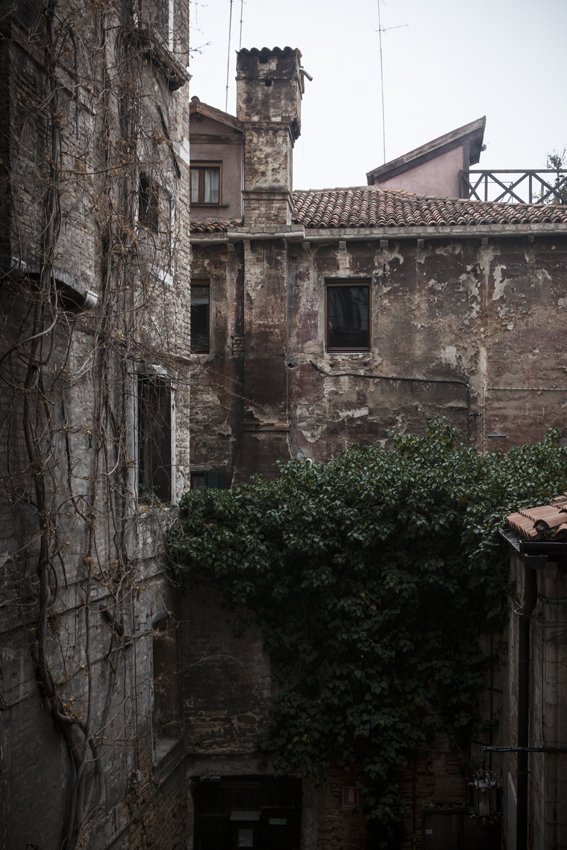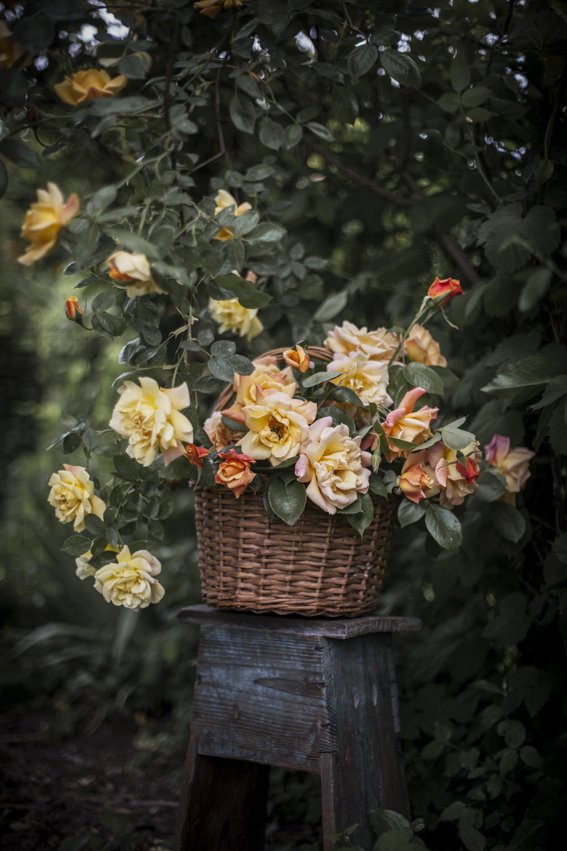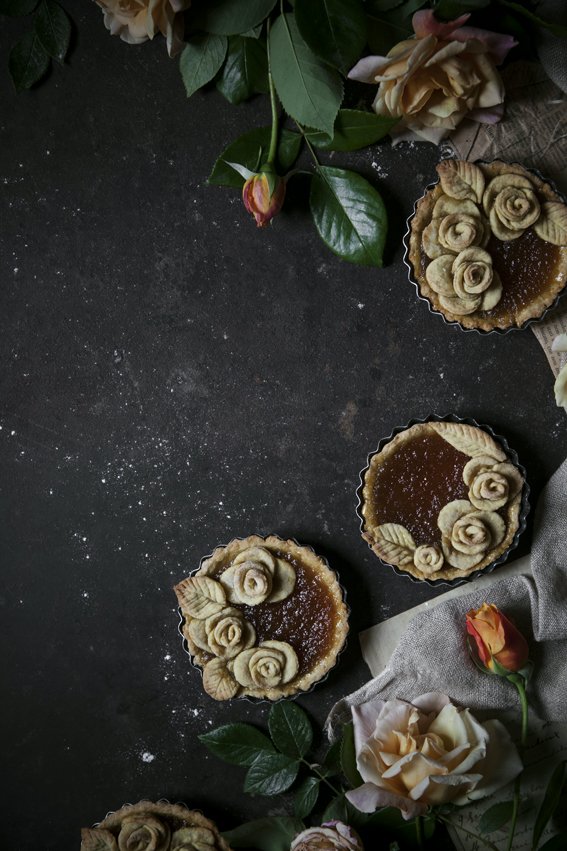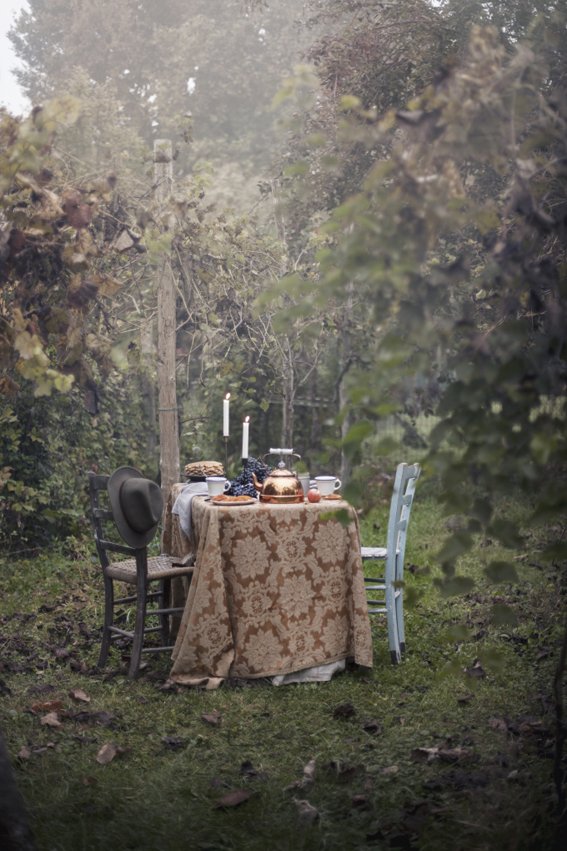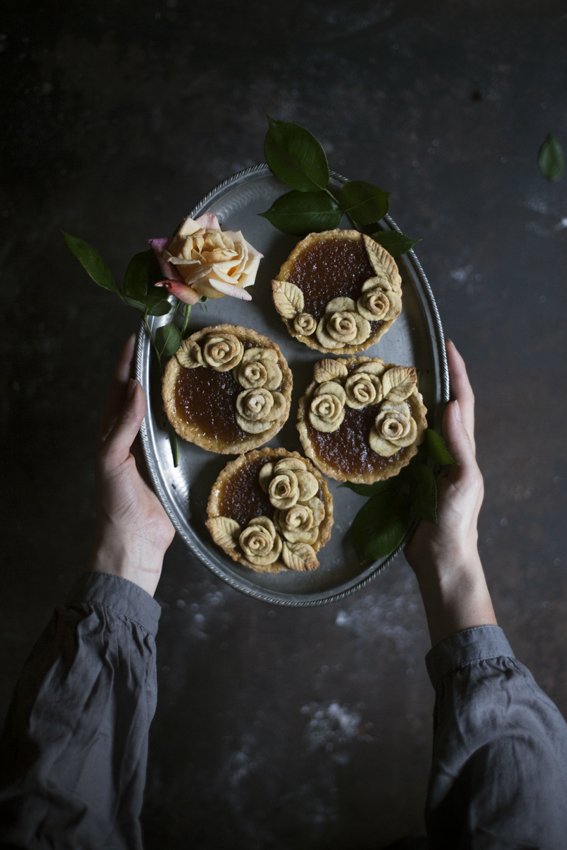Crostatine with homemade rose petal jam
with Miranda's roses & Glimpses from an ancient world
In my olfactory memory, the intense scent of some ancient varieties of roses is associated with secret Venice, that of the hidden gardens, those that you spy through the cracks of the old doors of noble palaces.
Behind those gates, there is a whole world, which is made of often uncultivated green areas, where forgotten species of plants and flowers have been preserved to this day in the stillness of courtyards.
Walking through the quiet secondary streets, those where only Venetians can cleverly extricate themselves to avoid crowded areas, sometimes you can perceive the presence of a garden nearby even without seeing it. More than the chirping of birds, which is usually rare to hear in Venice, the scents of rose or jasmine are the easiest to come across and, in the right season, act as an undeniable sign of a "garden-in-the-vicinity".
Sometimes the scent is so overwhelming that it distracts you from your thoughts. Maybe it's because the Calli of Venice are humid and almost always in the shade, but it really seems that every smell remains trapped, even bad ones.
When you come across a good one, though, it is impossible not to smell it, so you look up to see some branches popping up behind the walls, or you look for a small slot to take a quick peek at what for a few moments has the charm of a secret which is being unveiled just for you.
When you're lucky, your eyes catch the vision of a small, ancient, decadent, and fascinating world, which has incredibly survived the changes that time and man have brought to the rest all around.
The image that I have of Venice, and perhaps of Italy in general - like many other people probably have - is made precisely by these small precious moments, by these visions which are often stolen from timeless views.
One of these visions is particularly dear to me and over time has become more and more precious, just like my rose garden, which now - after many years - is enormous and increasingly bushy. It concerns precisely these ancient roses of my garden and their intense scent. I don't know their botanical name, but in my house, they are simply called "Miranda's Roses".
Miranda belonged to an ancient world that is slowly disappearing, and although she was born at the beginning of the last century, our paths crossed each other for a short time, when I was just a child and she was already very old. It was in the '90s, and I was in Tuscany, in that small Medieval village that later became my second home.
I was the Venetian-blondie (as everyone called me in the village) and she was a gracious Granny with a raspy voice and thin hands.
Together with her husband, she ran the old grocery store in the small town, one of those that no longer exists, where the food was still kept unpacked into some very old wooden drawers.
The shop was located at the foot of the village which is perched on a hill. On top of the hill, there were - and still are - the remains of an old Medieval castle.
Even today I often go back to this village, and now as before, I walk in front of what was Miranda's store, often thinking about how she has been a kind of Grandmother to me.
Every time we had to leave the village to go back home to Venice, Miranda dropped from the shop's window on the first floor a wicker basket that was tied to a rope and filled with candies and chocolates for me - "for the long trip", she used to say.
I used to send her a kiss looking from below to the balcony she was leaning out from to say goodbye waving her hand, surrounded by some beautiful climbing roses that grew on the wall of that old Medieval building, which was once a boundary wall of the village.
The roses became over time a magnificent and ancient rose garden with sturdy stems. They resisted so many years even after Miranda’s death, giving incredible and fragrant blooms every year, until some kind of destructive force - so typical of human beings - sadly found a way to arrive even up there, to that remote corner of the world.
One day, a backhoe at work uprooted everything to redo the paving of the road.
We arrived from Venice just in time to see the havoc and save a few roots of that plant, which in my visual and olfactory memory was linked to the remembrance of that kind woman, so dear as elderly.
We managed to save it and Miranda's roses have now become a lush and fragrant Venetian rose garden.
When the roses bloom we remember Miranda, and those little ancient worlds that some of us have been lucky enough to see and maybe, in some way, preserve ... as we do with jam!
CROSTATINE WITH HOMEMADE ROSE PETAL JAM
Rose petal jam:
(To make a small jar / about 250 ml)
* Warning: not all types of roses are edible, so be sure to find a quality of fleshy and fragrant wild roses which have not been treated with pesticides, better if grown in some gardens far from smog or polluting sources. Seize freshly blossomed roses and remove the lower white part of the petals that could be bitter.
Ingredients:
200 g rose petals
200 g granulated sugar
1 lemon
200 ml of water
Instructions:
Wash the rose petals and dry them as much as possible without creasing them. You can quickly centrifuge them in the salad basket and then place them flat on a dry cloth to remove all excess water.
Using a pair of scissors, cut the rose petals into small pieces, leaving aside the lower white part of the petals that could be bitter. Place them inside a large glass or ceramic bowl together with 100 g of sugar. Mix lightly with your hands so that all the petals are well sprinkled with sugar. Cover the bowl with some film and leave to macerate overnight.
Squeeze the juice of a lemon and put it together with 200 ml of cold water and 100 g of sugar in a large saucepan. Add the macerated rose petals and place everything on low heat.
Cook for about 20 minutes, stirring occasionally. Blend quickly with an immersion blender, to obtain a smooth and velvety jam, which almost looks like syrup but thicker. The consistency should not be too liquid; if necessary, cook the jam for 5 extra minutes.
Pour the still-boiling jam into a sterilized glass jar, then put the lid on and close well, and turn the jar upside down. Cover the jar with a blanket so that it will cool down slowly and will be vacuum-sealed.
Crostatine with rose petal jam:
(To make 4/5 crostatine)
Ingredients:
200 g flour
50 g brown sugar
80 g cold butter + a little to spread on the molds
2 egg yolks + 1 whole egg
1 organic lemon
1 pinch of salt
(A little milk if needed)
Instructions:
Pour the flour, sugar, and a pinch of salt into a food processor together with the cold butter cut into small pieces and mix at maximum speed to obtain a sandy mixture.
Quickly beat the whole egg and the egg yolks and add them to the mixture together with the grated rind of an organic lemon. Mix again at minimum speed for a few seconds until the ingredients come together.
Transfer the dough to a lightly floured wooden board and work with your hands quickly until you get a homogeneous ball. Wrap it with the film, put it in the fridge, and let it rest for 30 minutes.
After the resting time, remove the dough from the fridge and spread it quickly with a rolling pin on a lightly floured surface to make a sheet about ½ cm thick.
Make 4/5 equal discs with the same diameter as your molds (I used a glass to get the round shape) and place them on the buttered molds pressing a bit with your fingers to let them perfectly fit the surfaces.
Use the remaining dough to make the small roses to decorate your tarts. I used a bottle cup to make some mini-circles of dough (the petals of the pastry roses) that I rolled up one above the other into small groups of 4/5 to create the flowers. I got approx. 10/12 small roses but you can make less or more in order to use all the remaining dough.
Stuff the tarts with the rose petal jam up to the edge, leveling the surfaces with the back of the spoon, and add the small pastry roses on the jam surface of each tart to decorate them.
Transfer the tarts to a preheated static oven and cook them at 180 ° C for about 20 minutes until they become golden brown.
Remove them and let them cool down. Enjoy!



